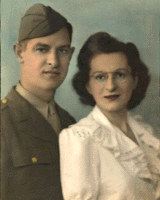
Florence Shore
is honored with a Brick from Elsie R. Shore.
 Can an ordinary woman be a heroine? Can someone who did nothing exceptional, who in fact tried to behave just as American society demanded, be heroic?
Can an ordinary woman be a heroine? Can someone who did nothing exceptional, who in fact tried to behave just as American society demanded, be heroic?
My mother Florence Shore was born Florence Ruth Schumer in New York City in 1919, the first child of Leon and Esther, immigrants from Eastern Europe. She lived her life in New York, first on the Lower East Side of Manhattan and then in Brooklyn. Although she could have gone to college, she chose instead to train to be a secretary. She didn't continue her education past high school because she didn't want to be a school teacher, which was, of course, virtually the only profession female college graduates were expected to adopt.
My mother married Sam Shore, on January 17, 1942. They had known each other for years and were part of a group of young people who remained friends all their lives. Sammy was an automobile body-and-fender repairman, but was about to become a soldier and be sent to the South Pacific. While he was away, Florence continued to work as a legal secretary; married women were expected to work while their husbands were at war. After the war, she quit her job and became a housewife. Shortly thereafter, I was born. My brother was born six years and two miscarriages later.
The woman I grew up with was not happy as a homemaker and mother. She didn't say so, and I doubt that she consciously realized it. She just tried to cope. Not like Lucy coped on TV, with harebrained schemes to find fulfilling work, but through socially acceptable outlets. She learned to paint flowers on china plates, took art lessons, later worked at home typing addresses onto envelopes ($5.00 a thousand). But mostly she passed her days half-alive. I'd come home from school at three o'clock to find her, in her nightgown, smoking her first cigarette and drinking her first cup of coffee. We'd pretend that she hadn't just woken up. By the time my father came home she was dressed, the house cleaned, and dinner on the table. Dinner and the evening with him was her best time. After my brother and father were asleep she sat in the living room, doing needlework and watching TV until the stations signed off.
From time to time she repeated a story about an adventure she had had while working, becoming animated and joyful telling it. When I got older I put two and two together and asked her why she had quit her job. "That's what we all did when the boys came home from the war." (If you are tempted to blame my father, don't. He wasn't an oppressor. He loved and trusted her and would have let her do anything she wanted to.)
When I was 16, my mother got a full-time job, and everything changed. She became a full-time person. No longer sleeping the day away, embarrassed and cross, she was alive, lively, funny. The woman whose hard features had often frightened me now smiled more than I would have imagined possible. She was happy--and we were happy too. My father, brother, and I kidded that from the time she started working we never had another hot meal at home, but it was just a joke. Only a monster would trade a person's soul for a pie. We were thrilled to have her among the living, and the loss of home-cooked food was a pittance to pay. For the rest of her life having a job sustained her, and gave us back the woman we loved.
Can an ordinary life be heroic? I think so.
Submitted by Ellie Shore
September 16, 1998










